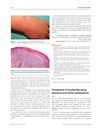Lichen Planopilaris in a Latin American (Chilean) Population: Demographics, Clinical Profile, and Treatment Experience
July 2017
in “
Clinical and experimental dermatology
”
lichen planopilaris LPP classic LPP CLPP frontal fibrosing alopecia FFA scalp dysaesthesia erythema peripilar hyperkeratosis cicatricial patches vertex area band-like scarring frontal hairline temporal hairline hypothyroidism dyslipidaemia hypertension topical medications systemic medications scalp discomfort redness scalp scaling scarring patches topical treatments oral treatments
TLDR Men with lichen planopilaris had earlier onset than women, and treatment usually improved the condition.
The study retrospectively reviewed 103 Chilean adults diagnosed with lichen planopilaris (LPP), including 67 women (mean age 54.1 years) and 36 men (mean age 39.1 years). It found that men with classic LPP (CLPP) had an earlier onset than women, and common symptoms included scalp dysaesthesia, erythema, and peripilar hyperkeratosis. Most patients with CLPP had cicatricial patches, primarily in the vertex area, while those with frontal fibrosing alopecia (FFA) exhibited band-like scarring in the frontal and temporal hairlines. Associated morbidities included hypothyroidism, dyslipidaemia, hypertension, and depression. Treatment typically required a combination of topical and systemic medications, which generally halted or improved the condition. This study highlighted the need for larger multicentre international research on LPP in diverse populations.











